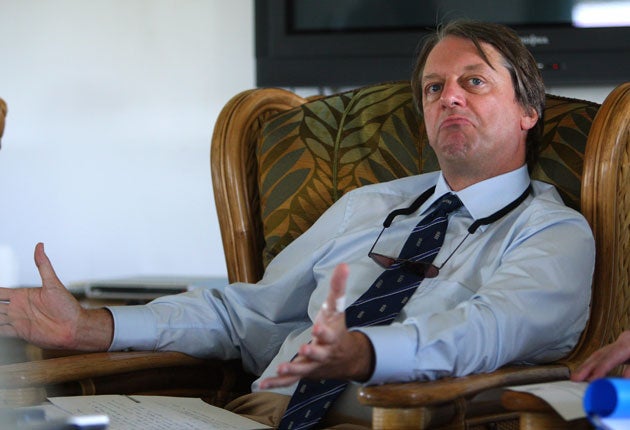Calls mount for Clarke exit over Stanford debacle
Hampshire chairman says ECB counterpart must go over dealings with tycoon

Your support helps us to tell the story
From reproductive rights to climate change to Big Tech, The Independent is on the ground when the story is developing. Whether it's investigating the financials of Elon Musk's pro-Trump PAC or producing our latest documentary, 'The A Word', which shines a light on the American women fighting for reproductive rights, we know how important it is to parse out the facts from the messaging.
At such a critical moment in US history, we need reporters on the ground. Your donation allows us to keep sending journalists to speak to both sides of the story.
The Independent is trusted by Americans across the entire political spectrum. And unlike many other quality news outlets, we choose not to lock Americans out of our reporting and analysis with paywalls. We believe quality journalism should be available to everyone, paid for by those who can afford it.
Your support makes all the difference.Hampshire chairman Rod Bransgrove last night called for the resignation of England and Wales Cricket Board chairman Giles Clarke and chief executive David Collier while simultaneously appealing for the return of Lord MacLaurin at the helm of cricket’s governing body.
Bransgrove, speaking on Test Match Special on BBC Radio 5 Live Sports Extra yesterday, is angry over the deal struck with Sir Allen Stanford, in which it was agreed to stage five one-off Twenty20 matches to be played annually every November with a $20m prize fund at stake each time.
Texan billionaire Stanford has been charged by Federal Regulators in the United States in connection with an alleged £6.4bn investment fraud and the ECB has ceased negotiations. And a proposed quadrangular Twenty20 tournament involving England, a Stanford West Indies Select XI, New Zealand and Sri Lanka, scheduled for the end of May at Lord’s as a precursor for June’s Twenty20 World Cup, has also been shelved.
Bransgrove, speaking during lunch on the fourth day of the third Test in Antigua between England and the West Indies, said: “I always felt uneasy about the relationship [between the ECB and Stanford]. I thought it was rather a tacky arrangement with a pretty tacky person. It didn’t stack for me from day one and I made that clear.”
And when asked if the matter was a resigning issue for the chairman and the chief executive, he replied: “In my view unquestionably [the chairman and chief executive should be considering their positions].
“This latest revelation has completely destroyed any integrity the chairman had. It’s clear he has lost his credibility as the leader of English cricket and I don’t think he has any option but to stand down.”
When Jonathan Agnew, the BBC’s cricket correspondent, asked Bransgrove if Lord MacLaurin, who served three terms of office as chairman of the ECB from 1997 to 2002, should return to take charge, the Hampshire chairman and millionaire responded: “I don’t know but certainly he would be an excellent option if he were available. I would definitely welcome support from Lord MacLaurin, someone who has a proven track record.” There is a suspicion that Bransgrove may have sounded out Lord MacLaurin about such a possibility, although it could not be substantiated.
Bransgrove continued: “What Giles Clarke led English cricket into was a major strategic decision. We moved away from the establishment of cricket, away from the BCCI [India’s governing body], and put all our eggs in the Stanford basket. That’s a major strategic error for which I think a chairman should take responsibility.”
But Lord Morris, the former Trades Union leader and a member of the ECB committee, defended Clarke. “It is not an issue over which anybody needs to resign,” he insisted. “I’m a member of the board, we all accept collective responsibility for the decision. We had a proposal, we considered it carefully, we saw the benefit to English cricket, the benefit to West Indian cricket and indeed the benefit to the island of Antigua. On that basis we did our due diligence. We are not regulators, we are administrators. We protected the interests of the ECB and English cricket in particular.”
And there was support from Durham chairman Clive Leach, who is not on the ECB Board. “I don’t think he [Clarke] should resign. I think we all didn’t like the brashness, the demeanour of Allen Stanford, but what was very clear was that there were substantial funds available, or so it seemed at the time.
“A deal was done and I didn’t hear any of the chairmen, including Rod [Bransgrove], say that it was a bad deal in terms of the money. And as I understand it, the first tranche has been paid, all the counties have got around £50,000 each, the grassroots game has got another half a million.”
Somerset chairman Andy Nash added his support to Clarke, writing on the county’s website: “The idea that the ECB’s due diligence processes should prove more effective than those of the Securities Exchange Commission or the FSA at uncovering [financial] wrongdoing is laughable. ECB stand for the England (& Wales) Cricket Board, not the European Central Bank.”
Stanford’s sporting ties
Outside of cricket, Sir Allen Stanford is involved with:
Golf Stanford Financial Group sponsors the PGA Tour Stanford St Jude Championship. Stanford also sponsors Vijay Singh, Henrik Stenson and David Toms, while an LPGA event offers a £1.4m purse.
Tennis Supports the Sony Ericsson Open, an event with £3.2m in prize money, and the Champions Series Tennis Tournaments.
Polo Finances the US Open Polo Championship and the USPA Silver Cup. Stanford also sponsors the International Polo Season, the Stanford Charity Day and the Texas Open Invitational.
Sailing Bankrolls the Stanford Antigua Sailing Week.
Football Newcastle striker Michael Owen was recruited as a SFG global ambassador last April.
Join our commenting forum
Join thought-provoking conversations, follow other Independent readers and see their replies
Comments